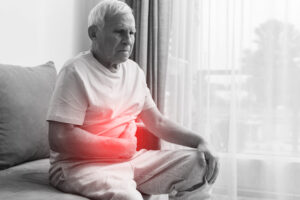
Signs of Stomach Ulcers
Stomach ulcers are open sores that develop on the lining of the stomach or small intestine, but heartburn is caused when stomach acid flows back into the esophagus.

Irritable bowel syndrome (IBS) is a common disorder that affects the digestive system, specifically the large intestine. Various symptoms characterize it, including abdominal pain, bloating, and changes in bowel habits, such as diarrhea or constipation. IBS is not life-threatening, but it can significantly impact a person’s quality of life. The exact cause of IBS is not fully understood, but factors such as a sensitive digestive tract, family history, and stress may contribute. Unlike inflammatory bowel disease (IBD), IBS does not cause inflammation or permanent damage to the intestines.
Studies have found that up to 60% of people with IBS also experience symptoms of anxiety and depression. The exact cause of this relationship is still unclear. However, it is believed that the physical discomfort and pain caused by IBS can trigger or worsen existing mental health conditions, leading to feelings of frustration, isolation, and low self-esteem. This can further contribute to the development or exacerbation of mental health issues.
Individuals with IBS need to prioritize their mental health as well as their physical health. Here are some tips for managing the impact of IBS on mental health:
Some people may feel embarrassed or self-conscious about their symptoms, leading to social isolation and withdrawal from social activities. Here are some ways to manage IBS’s impact on your social life:
Isolation: The unpredictable nature of IBS means that people may feel uncomfortable leaving their homes for extended periods or going to places where they are unsure about bathroom access. This could lead to feelings of isolation and make it difficult to maintain relationships with friends and family.
Dietary Restrictions: Certain foods can trigger IBS symptoms, which may mean avoiding certain types of food or eating at specific times. This could make it challenging to go out for meals with friends or attend social events where food is a significant part of the gathering.
Self-Esteem: Constant worries about bathroom access, fear of embarrassing situations, and limitations in activities due to symptoms can lead to feelings of inadequacy and low self-worth. This may result in misunderstandings or being dismissed by friends or family members who do not understand the severity or impact of the condition.
Emotional Draining: Conditions like anxiety and depression can further contribute to a person’s social life as they may withdraw from activities they once enjoyed or feel uncomfortable around others.
People with IBS often experience sudden flare-ups or unpredictable symptoms, making it challenging to plan a trip with confidence.
Choosing Destinations: When selecting a destination, consider factors such as climate, food options, and restroom accessibility.
Planning Transportation: When planning your transportation, opt for options that allow you to move around or take breaks if needed. If you’re traveling by plane, please inform the airline beforehand about your condition so they can accommodate any special needs.
Packing Essentials: Be sure to pack prescription medication, over-the-counter remedies, changes of clothes, and hygiene products. It’s also helpful to research ahead of time if your destination has accessible pharmacies or stores where you can purchase any necessary items.
Managing Stress: To help manage stress while traveling, plan your trip well in advance and give yourself plenty of time to get to the airport or train station. You can also practice relaxation techniques like deep breathing or meditation while traveling.
IBS triggers can vary from person to person, but common triggers include certain foods, stress, and changes in routine.
If you experience symptoms of IBS, including abdominal pain, bloating, changes in bowel movements, or unexplained weight loss, it’s essential to consult a doctor for a proper diagnosis. While IBS is not life-threatening, some symptoms may overlap with more serious conditions like inflammatory bowel disease (IBD) or colon cancer. If you notice your symptoms worsening over time or interfering with your daily life, seeking medical advice can help you manage the condition and improve your quality of life.
If you want counseling on things you can do to make life with IBS a little easier, consult the Allied Digestive Health experts.

Stomach ulcers are open sores that develop on the lining of the stomach or small intestine, but heartburn is caused when stomach acid flows back into the esophagus.

Poorly absorbed carbs may ferment in the gut, leading to symptoms such as bloating, gas, diarrhea, or constipation.

If left untreated, GERD can lead to complications including esophagitis (inflammation of the esophagus), strictures (narrowing of the esophagus), or even Barrett’s esophagus, a condition that increases the risk of esophageal cancer.

IBS-C often requires a tailored approach that incorporates dietary changes, stress management, and sometimes prescribed medications to regulate bowel movements and reduce discomfort.

Hepatitis C can affect women differently due to hormonal variations, immune system responses, and unique physiological factors

This connection means that stress, anxiety, and other psychological factors can directly impact gut function, leading to symptoms like abdominal pain, bloating, and irregular bowel movements.

Chronic inflammation associated with IBD can lead to complications such as joint pain, skin conditions, eye issues, and more.

How different types of fiber affect IBS is crucial to creating a diet that supports digestive health without triggering flare-ups.

Lactose Intolerance occurs due to a deficiency of lactase, the enzyme responsible for digesting lactose in the small intestine.

This condition can result from various factors, including poor diet, stress, infections, or underlying health conditions like IBD.

One of the most essential steps in managing IBS is identifying specific triggers and paying attention to your body’s unique responses.

Although the symptoms of IBS can vary widely from person to person, several common signs are associated with the condition.
For Your Visit
Brick Office
P: 732-458-8300
Brick Medical Arts Building
1640 Route 88, Suite 202
Brick, New Jersey 08724
Mon – Fri: 8:30AM – 5:00PM
Sat & Sun: Closed
Neptune Office
P: 732-776-9300
Jersey Shore Medical Arts Building
1944 Corlies Ave. Suite 205
Neptune, New Jersey 07753
Mon – Fri: 8:30AM – 5:00PM
Sat & Sun: Closed
Jackson Office
P: 732-928-2300
706 Bennetts Mills Road
Jackson, New Jersey 08527
Mon – Fri: 8:30AM – 5:00PM
Sat & Sun: Closed
© All Rights Reserved